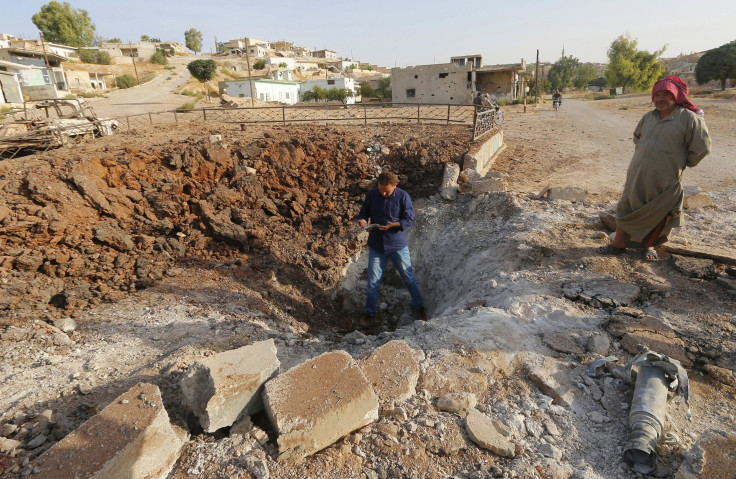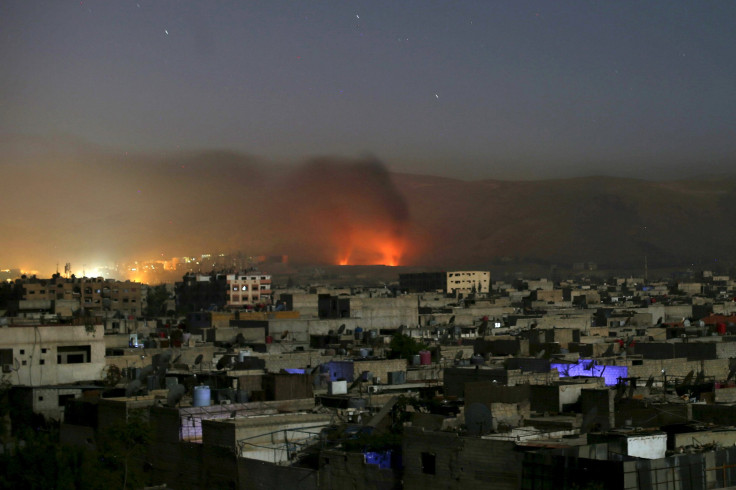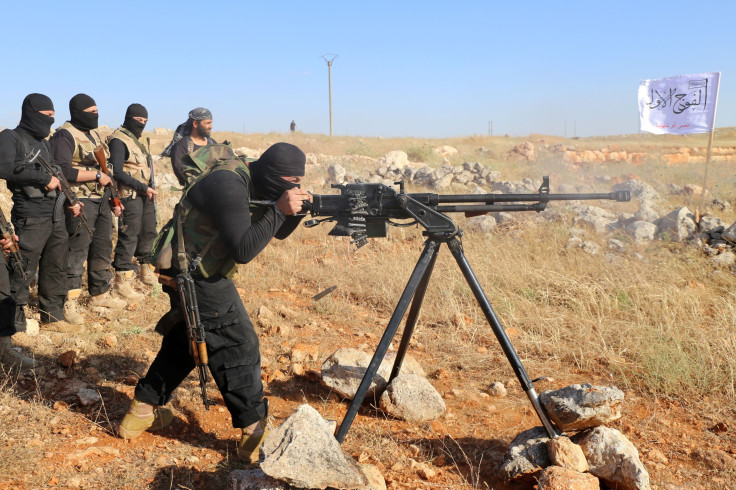In Search Of New Funding And Weapons, Moderate Syrian Rebels Say Aleppo Is Falling

Two days before Russian bombs descended on Syrian cities this month, Syrian rebels in the northwestern city of Aleppo received a shipment of more than 500 anti-tank missiles from U.S. allies Saudi Arabia and other Gulf states. Now rebels fear that shipment will be their last.
The U.S. and its partners are shifting their focus, and their financial backing, to Kurdish rebels in the northeastern part of the country, leaving local rebel fighters fearful that -- with increased Russian airstrikes on their territory -- the Islamic State group, commonly known as ISIS, will take the country’s second-largest city.
“[ISIS] has already taken seven smaller villages in the Aleppo countryside,” said Oussama Abu Zayd, an adviser to the rebels that received weapon support from the U.S. under a CIA program. “Aleppo now is very dangerous. I can’t stress that enough.”
Abu Zayd's group of rebel fighters were considered "moderates" by the U.S. government and its Western allies and were part of the original, but now largely defunct, Free Syrian Army.
If ISIS takes over Aleppo, the terrorist group will seize control of a strategically important highway that leads north to the border of Turkey, a key supply route, and east to Raqqa, the militant group's de facto headquarters. Syrian rebels have not worried about the fall of Aleppo for close to six months, Abu Zayd said, but since the Russian airstrikes started, rebels have seen ISIS advance quicker that at any time in the past two years.
Abu Zayd and another rebel commander in Aleppo, who requested to remain anonymous because he's in active battle, said the rebels refer to the Aleppo countryside as the country’s “free zone” -- an area of land that ISIS can control because Russian airstrikes clear a path for them to move into territory previously held by other rebels.
Col. David Warren, a spokesman for the U.S. State Department, said in a press briefing Tuesday that Russian airstrikes were not helping Syrian President Bashar Assad, an ally of Russia, but were allowing ISIS to advance in key areas in the north.
“ISIS is doing a good job of taking advantage of the Russian airstrikes,” Warren said.

Rebels say ISIS advances have given way to Syrian regime advances.
"Every time ISIS gains back territory in Aleppo, the regime is not far behind," Abu Zayd said. The Syrian regime and its allied forces in the country are in the process of launching a new offensive to take back Aleppo from the rebels, and from ISIS. Iranian forces will take part in the offensive, Reuters reported Tuesday.
Although the U.S. administration has been quick to speak out against Russian airstrikes in Syria, it has done little to stop Russian military intervention. U.S. policy has turned its back on the rebels under Russian attack in Aleppo and is instead arming Kurdish fighters in Hasakeh, in northeastern Syria.
Over the weekend, a U.S. C-17 jet delivered a load of small arms ammunition to a select group of Kurds and their Arab partners for use in the fight against ISIS. The airdrop consisted mostly of bullets and ammunition for small arms and rocket-propelled grenades, the Pentagon said in a briefing Tuesday.
"This is not meant to help Syrian rebels fighting Assad," said Mohammed Ghanem, a senior political adviser in Washington at the Syrian American Council, a grassroots organization. "The Kurd and Arab rebels that got the weapons have plans to pressure Raqqa [ISIS headquarters]."
Ghanem said that for the past few months the U.S. has been ramping up support for rebels who vow to use the weapons to fight ISIS exclusively. The U.S. is not giving weapons to rebels who want to use them to fight Assad, he said.
The airdrop took place in northern Syria where the Kurdish militia, also known as the YPG, has carved out an autonomous zone and advanced into the Islamic State's stronghold Raqqa province. The Kurds have been one of the most reliable and successful rebel groups to work with the U.S. They are now taking the place of the so-called moderate rebels.
Though they have not been shut out entirely, the moderate rebels, focusing on fighting Assad first, not ISIS, are anticipating a shortfall in weapon stocks, especially in TOW anti-tank missiles, one of the most powerful weapons the rebels have.

In the summer of 2013, the CIA provided the rebels with TOW missiles under a covert program. Some missiles continue to trickle into the country from American allies such as Saudi Arabia, but they won’t last long, rebels say, especially if the U.S. invests more in the Kurds.
Western media reported U.S. allies sent a large number of TOW missiles to Syrian rebels after the first round of Russian airstrikes, but Abu Zayd told International Business Times that the missiles arrived before the first Russian bomb was dropped.
“We got nothing after the Russian invasion. The shipment we received was just part of a shipment that we would have normally gotten anyway," he said, adding that the rebels in Syria receive the missiles via truck at the Turkish border near Azaz and one crossing to the west of Idlib.
Abu Zayd said the members of various rebel groups in Aleppo met Monday to devise a plan to evade Russian airstrikes and continue to take on the Islamic State group and Assad’s regime. Their solution: continue to press the U.S. and its allies to do more to prevent Russian airstrikes. But so far that plea has gone unanswered.
For at least a year, the U.S. has been in negotiations with some of its allies, such as Turkey, the U.K. and Germany, about how best to leave a military footprint in Syria. The consensus is to ramp up support for the moderate opposition in the form of weapon assistance without tipping the scale too much in one direction. That plan, rebels say, has led to the downfall of several rebel organizations and has allowed ISIS to gain ground.
Still, the U.S. is pulling back from supporting the moderate rebels that had been armed under the old 2013 CIA program. On Friday, the Pentagon announced it would end the training of anti-Assad rebels. The declaration came at the same time senior White House officials are devising a plan to implement local ceasefires in the country, a tactic that will work only if Assad is in place for negotiations.
National Security Council staffers, including senior coordinator for the Middle East Rob Malley, are advising President Barack Obama that having Assad in power is the best way to keep discussions open with Russia and prevent ISIS from gaining ground.
Anti-regime rebels are the losers in this policy change. More than investing in weapons, Abu Zayd says the rebels need someone to believe in their cause -- ousting Assad.
© Copyright IBTimes 2024. All rights reserved.





















